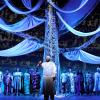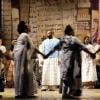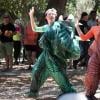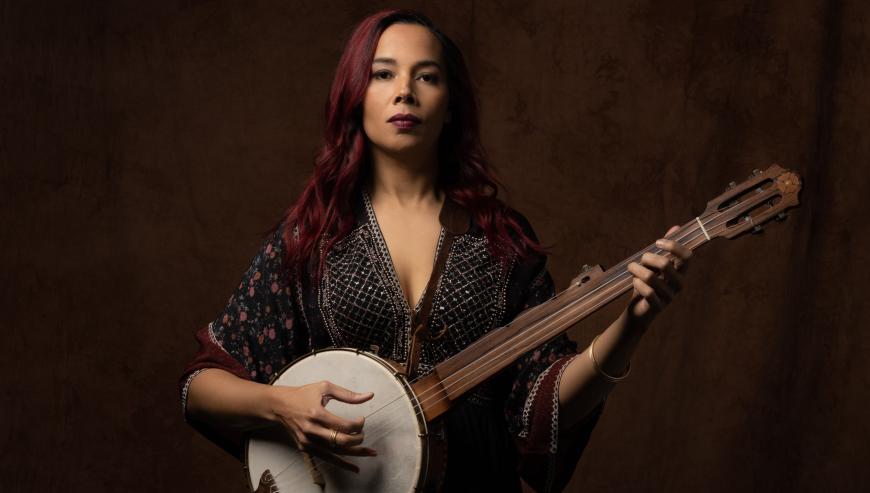
Anyone who has ever taken part in a major arts festival knows how the physical and mental pressure ratchets up exponentially as opening night draws near— moments of tranquility are to be treasured.
For both the music director of this year’s Ojai Music Festival, Rhiannon Giddens, and her musical collaborator, Francesco Turrisi, that means spending precious time at their respective homes in Ireland.
Having just garnered the Pulitzer Prize for Music (with composer Michael Abels) for her opera Omar, Giddens has been the focus of a wave of press attention. But she and Turrisi still found time on Zoom to discuss the global assemblage of musicians that the Ojai Festival will bring together, including members of the world-music collective Silkroad, which Giddens heads, as well as the themes that will be explored in the programming.
Since its founding in 1947, the Ojai Festival has privileged the Western European classical tradition and European modernism in particular. And those roots will certainly be on display again next year when Ojai’s 2024 music director, Mitsuko Uchida, leads a celebration around Arnold Schoenberg’s 150th birthday.
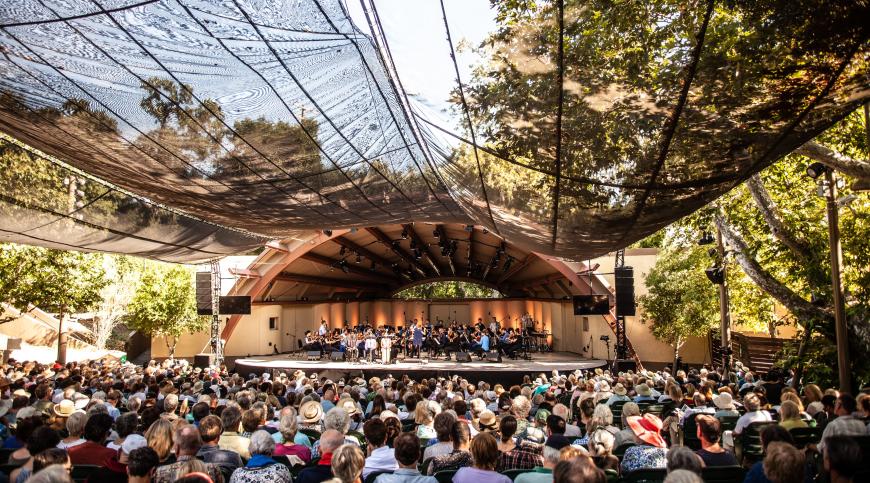
World music has had an occasional presence at the festival. In 1983, Ravi Shankar was presented in a raga concert, which you can listen to on YouTube. There are also those of us that can remember when the Sunday morning concerts were devoted to jazz. This year, however, will mark the first time world music and the role of improvisation will be a primary focus at Ojai.
The way Giddens puts it, “It’s a question of framing and perspective, what we’re told something is. For example, improvisation versus classical notation. Our work has a lot to do with decentering American perspectives about these different musical traditions, rather than fetishizing European art music. It raises the whole question of ‘What is folk music?’ and ‘What is classical music?’ We don’t really believe in genres. They’re just boxes created either to sell something or separate people.
“Music,” she continues, “is like language. The question becomes, ‘How can we communicate together? Where are our natural points of connection?’ You have your instrument, and I have mine. You have your tradition, and I have mine. When I first started to play with [Silkroad founding member] Wu Man, we discovered her instrument, the Chinese pipa, and my American banjo have three tuned strings in common. It was the beginning of a conversation. This whole festival is about crossroads and where those crossroads are. But it’s not just about throwing people together. These musicians have spent their lives developing their skills.”
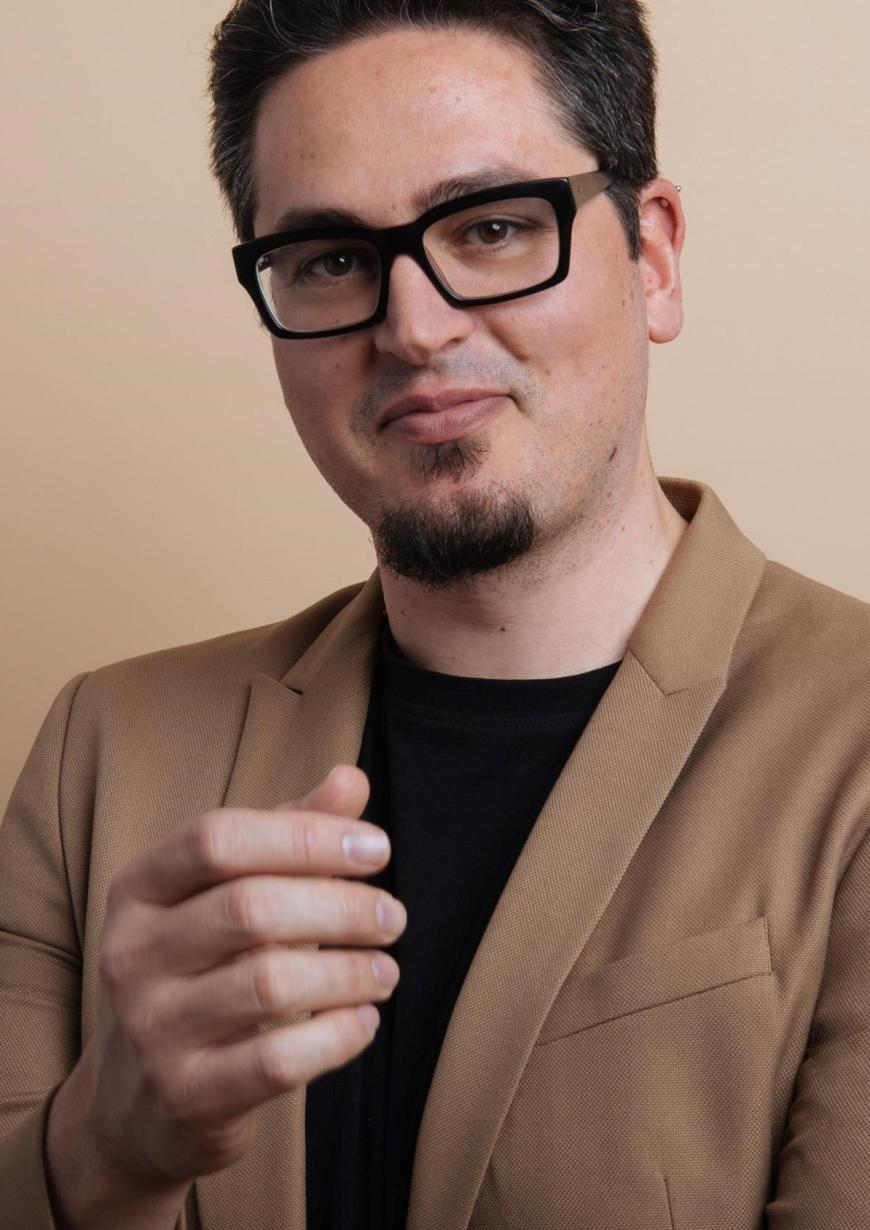
Giddens and Turrisi often focus on how improvisation versus strict notation can affect a performance. The issue is particularly acute for Turrisi, who received his master’s degree in jazz piano and early music from the Royal Conservatory of The Hague — a seemingly incompatible mixture that he managed to blend together as a member of the far-from-traditional early-music ensemble L’Arpeggiata. As he loves to point out, improvisation played an enormous role in the popular songs and dances of the early Baroque era:
“We did a lot of crossover and mixed up a lot of things. It wasn’t straight-ahead Baroque music. Honestly, I’d be terribly bored going to a concert where I knew how everything was going to sound before it starts. It’s the problem I have playing classical music where you already know every note that’s going to be played. I love classical music. I grew up playing it. But I love to have moments when I don’t know where [the music is] going.”
Giddens chimes in: “Classical musicians want to rehearse everything to death. They want to control every detail of the performance. The jazz guys, they just want to show up and see where it goes, otherwise you’re spoiling the fun. I’ve found that with classically trained musicians, the type of playing we do can generate a degree of panic. It is nice to know what will happen at certain points. It’s a mixture. But if there aren’t special surprises, we haven’t done our job. I want people to be out of their comfort zone. I’m going to be out of mine,” she adds with a laugh.
Two years ago, when Giddens and Turrisi first appeared at Ojai, they were, as he puts it, “just doing our thing.” This time they’re pulling the strings, literally and figuratively.
“We’re not trying to turn the festival upside down,” says Giddens. “We’re looking to bring many musical threads together under the same umbrella.”
“The element of surprise is part of the Ojai Festival’s identity,” says Artistic and Executive Director Ara Guzelimian. “Just when you think you know what we’re about, just wait. That’s the reason I asked Rhiannon [after her first Ojai Festival appearance in 2021] if she would be interested in coming back in 2023 as music director. She’s an artist with such a wide-ranging style and determination not to be categorized.”
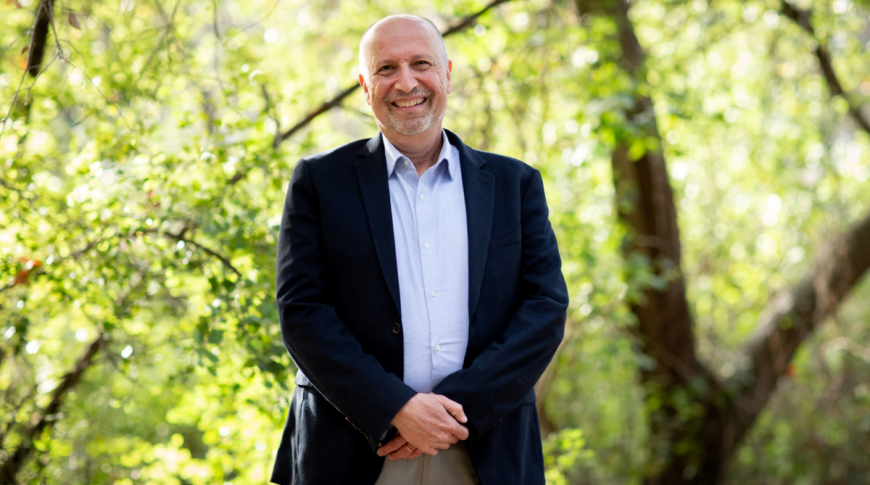
If there’s a unifying theme to this year’s festival, it’s exploring the connections between musical traditions all over the world, whether it’s showcasing Senegalese kora player Seckou Keita, the bravery of the Iranian Female Composers Association, or the cultural/musical explorations of American folklorist Justin Robinson. It’s an approach summed up in the title of Gabriela Ortiz’s 2014 composition Liquid Borders, which will be performed by the UC San Diego-based percussion ensemble red fish blue fish on Thursday night, June 8. For the second half of that concert, the Attacca Quartet will play works ranging from Joseph Haydn to Philip Glass to Squarepusher and Giddens.
“The whole festival,” says Guzelimian, “raises the question of ‘What does classical music mean?’”
Some of the highly anticipated programs include two performances of Tan Dun’s Ghost Opera (June 9 and 10), featuring the Attacca Quartet, Wu Man, and dancer and choreographer PeiJu Chien-Pott. On Friday night, Turrisi and Giddens present a wide-ranging recital. Sunday morning’s 10 a.m. concert of early music programed by Turrisi is described as “ranging from thousand-year-old works for solo pipa to Renaissance consort music, from ancient Persian melodies to modal jazz improvisations.”
And then there’s Omar.
When Guzelimian invited Giddens to become music director, he proposed that she and Abels create a concert version of their opera. They agreed. But speaking just a week before Saturday’s premiere, Giddens sounds like she wishes she’d never been asked.
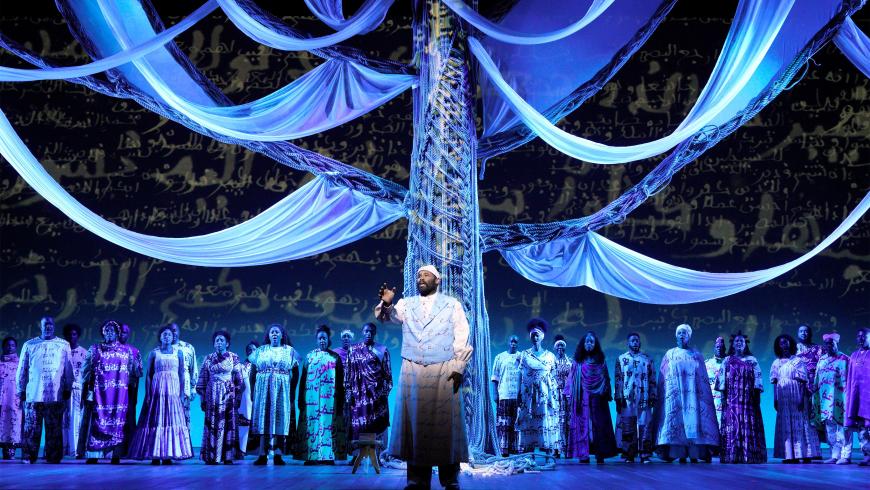
“Michael and I have had to kill a lot of our children,” Giddens says, sounding a bit like Medea. “That’s hard. It’s not something I ever want to do again. Michael’s been producing the parts and the orchestration. My job will be more in the moment figuring out what works and what doesn’t.”
For those not familiar with the opera, it’s epic in scope, following the personally documented life story of a Muslim scholar who was abducted from his homeland in Senegal and forced to endure the horrors of the Middle Passage to the Carolinas, where he was auctioned and lived the rest of his life as a slave. His autobiography, which he wrote in Arabic, still exists and is the opera’s source material. Reducing the scope down to a single act is clearly driving Giddens crazy.
“We have five singers, four Black, one white. It’s really challenging, and they have to play multiple roles. The singer who plays Omar also has to be a member of the chorus. In the opera, Omar’s journey is spiritual, and there’s a framework for that. In a concert version we have to decide how much people need to know. Ara said, ‘Can we do it in 45 minutes?’ I said, ‘No. NO!’ We’re still negotiating. We really won’t know if it works until we do it.”
Just like improvisation.


